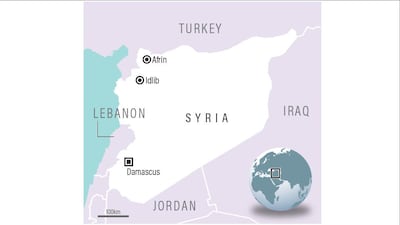Dr Abdo was still in his city but having gone to the main square where thousands of fellow citizens were packed on to buses that would carry them to northern Syria, it would not be home for much longer. Such has become the choice for the people of Eastern Ghouta: leave and survive or stay and be killed in air strikes.
The sheer scale of what was about to occur - a mass forced displacement - meant there were too many people that day.
Waiting alongside the next batch of evacuees, amid the burned husk of his city, he was asked if he would take something to remind him of his home. "Only my grief," he answered.
Tens of thousands of civilians have already left eastern Ghouta, many to areas controlled by the government of President Bashar Al Assad, fleeing in desperation a bombardment that killed more than 1,500 people in a month and laid waste to the last rebel stronghold near the capital Damascus.
Thousands more, and fighters from the local rebel factions, Faylaq al-Rahman and Ahrar al-Sham, have taken the large buses now synonymous with forced displacement in Syria, to the northern province of Idlib. They left under the terms of a deal negotiated between Russia, Mr Assad's main backer, and the local rebels, unwilling to trust that they will be protected by Russian guarantees from persecution by the government.
________________
Syria: Assad closes in on Ghouta as rebels leave
________________
They will join more than 2.6 million people in Idlib, the only province mostly controlled by the opposition, where over a million are internally displaced refugees from other parts of the country. Those refugees were also transferred there after local surrender deals throughout Syria, such as in late 2016 when the city of Aleppo was reclaimed by the Assad regime.
Idlib had long been controlled by an alliance of Islamist rebels that drove out government forces in the spring of 2015, a coalition that included Al Qaeda-linked militants Jabhat al-Nusra. The group consolidated its power, morphing into different iterations that claimed to sever their ties with the global terror network, and finally established military control over the province late last summer.
The remnants of the rebel groups they drove out have in turn been reconstituted and are now fighting a broad war of attrition against the terror group, now known as HTS, compounding the misery of civilians there living under threat of airstrikes. Neither side has emerged as the clear favourite.
But observers and foreign officials have long seen the forced exile of civilians to Idlib, amid the military dominance of HTS, as a ploy to create a shooting gallery of undesirable elements. Enmeshing extremists linked to Al Qaeda with exiles from around the country, Idlib is supposed to embody the regime's narrative from the Syrian war's outset that Mr Assad and his backers are fighting terrorists.
"What happened in Ghouta was a compounded crime of killing, forced displacement, bombing hospitals, siege and food deprivation, and the question is what comes next," said Bassam Mustafa, an official at the alliance fighting the Al Qaeda militants in Idlib. "The crimes that Russia is committing against civilians in Syria until now are only a small portion of what is being prepared for Idlib."
The people of Ghouta are hardly leaving for sanctuary. They will instead arrive to rebel infighting and daily battles between the opposition and Al-Qaeda-linked militants in which towns frequently change hands.
Rebels backed by Turkey, who conquered the Kurdish enclave of Afrin earlier this month, now also have a ground corridor into Idlib, and have indicated their desire to surge into the province to fight extremist groups there.
All that is compounded by a humanitarian crisis – tens of thousands of civilians have fled towards the border with Turkey after an Assad regime incursion into Idlib in late 2017, and densely-populated towns have become even more crowded with new arrivals fleeing the violence, desperately straining services.
Airstrikes have also continued sporadically, despite the presence of Turkish observation points that are part of a now-collapsed "de-escalation" deal to stem the violence in Syria. Two airstrikes last Thursday on a market in the densely populated town of Harem near the Turkish border killed 38 people, around half of them children, and wounded 63.
"Medical care in Syria is highly needed, but in some areas the capacity struggles to cope with the day-to-day needs let alone massive casualty events like this bombing," said a doctor working with Medecins sans Frontieres to oversee health facilities in the area.
"It is painful to live at a time when children are killed and wounded in the bombing of a busy public market."
It is unclear if Mr Assad's troops will now move towards Idlib, having consolidated their hold over other former rebel strongholds and backed by Russia, Iran, military momentum and surging morale after major victories. The complexity of the battlefield, the concentration of rebel fighters and the presence of forces backed by regional powers would likely complicate such an operation.
Idlib may yet emerge as a bargaining chip in the stalled peace talks in Syria. But for now, the misery of those who sought refuge there will continue.
"Those fighting in Syria and those with influence over them have from the first day of the conflict completely disregarded all laws and all rules meant to protect children," said Geert Cappelaere, UNICEF's Middle East director, the day after last week's attacks. "The war on children in Syria continues relentlessly and with no mercy."



